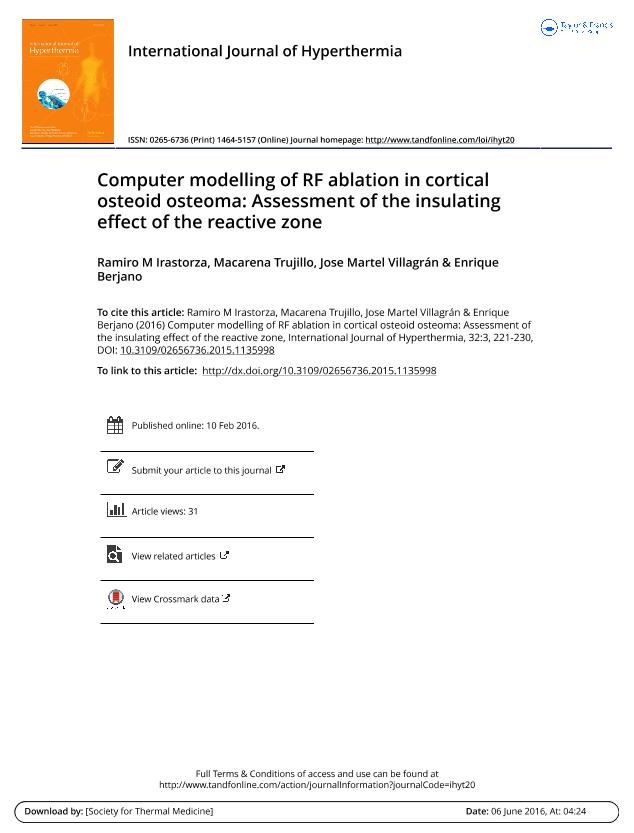Mostrar el registro sencillo del ítem
dc.contributor.author
Irastorza, Ramiro Miguel

dc.contributor.author
Trujillo, Macarena
dc.contributor.author
Martel Villagrán, Jose
dc.contributor.author
Berjano, Enrique
dc.date.available
2017-06-05T20:03:26Z
dc.date.issued
2016-02-05
dc.identifier.citation
Irastorza, Ramiro Miguel; Trujillo, Macarena; Martel Villagrán, Jose; Berjano, Enrique; Computer modelling of RF ablation in cortical osteoid osteoma: Assessment of the insulating effect of the reactive zone; Informa Healthcare; International Journal Of Hyperthermia; 32; 3; 5-2-2016; 221-230
dc.identifier.issn
0265-6736
dc.identifier.uri
http://hdl.handle.net/11336/17522
dc.description.abstract
Abstract: Purpose: The aim was to study by computer simulations the insulating role of the reactive zone surrounding a cortical osteoid osteoma (OO) in terms of electrical and thermal performance during radiofrequency ablation (RFA). Material and methods: We modelled a cortical OO consisting of a nidus (10 mm diameter) enclosed by a reactive zone. The OO was near a layer of cortical bone 1.5 mm thick. Trabecular bone partially surrounds the OO and there was muscle around the cortical bone layer. We modelled RF ablations with a non-cooled-tip 17-gauge needle electrode (300 s duration and 90 °C target temperature). Sensitivity analyses were conducted assuming a reactive zone electrical conductivity value (σrz) within the limits of the cortical and trabecular bone, i.e. 0.02 S/m and 0.087 S/m, respectively. In this way we were really modelling the different degrees of osteosclerosis associated with the reactive zone. Results: The presence of the reactive zone drastically reduced the maximum temperature reached outside it. The temperature drop was proportional to the thickness of the reactive zone: from 68 °C when it was absent to 44 °C when it is 7.5 mm thick. Higher nidus conductivity values (σn) implied higher temperatures, while lower temperatures meant higher σrz values. Changing σrz from 0.02 S/m to 0.087 S/m reduced lesion diameters from 2.4 cm to 1.8 cm. Conclusions: The computer results suggest that the reactive zone plays the role of insulator in terms of reducing the temperature in the surrounding area.
dc.format
application/pdf
dc.language.iso
eng
dc.publisher
Informa Healthcare

dc.rights
info:eu-repo/semantics/openAccess
dc.rights.uri
https://creativecommons.org/licenses/by-nc-sa/2.5/ar/
dc.subject
Computer Modelling
dc.subject
Cortical Bone
dc.subject
Finite Element Method
dc.subject
Osteoid Osteoma
dc.subject
Radiofrequency Ablation
dc.subject
Reactive Zone
dc.subject.classification
Otras Ciencias Naturales y Exactas

dc.subject.classification
Otras Ciencias Naturales y Exactas

dc.subject.classification
CIENCIAS NATURALES Y EXACTAS

dc.subject.classification
Otras Ingeniería Eléctrica, Ingeniería Electrónica e Ingeniería de la Información

dc.subject.classification
Ingeniería Eléctrica, Ingeniería Electrónica e Ingeniería de la Información

dc.subject.classification
INGENIERÍAS Y TECNOLOGÍAS

dc.title
Computer modelling of RF ablation in cortical osteoid osteoma: Assessment of the insulating effect of the reactive zone
dc.type
info:eu-repo/semantics/article
dc.type
info:ar-repo/semantics/artículo
dc.type
info:eu-repo/semantics/publishedVersion
dc.date.updated
2017-06-05T14:49:18Z
dc.journal.volume
32
dc.journal.number
3
dc.journal.pagination
221-230
dc.journal.pais
Reino Unido

dc.description.fil
Fil: Irastorza, Ramiro Miguel. Universidad Nacional Arturo Jauretche; Argentina. Consejo Nacional de Investigaciones Científicas y Técnicas. Centro Científico Tecnológico Conicet - la Plata. Instituto de Física de Liquidos y Sistemas Biologicos. Universidad Nacional de la Plata. Facultad de Cs.exactas. Instituto de Física de Liquidos y Sistemas Biologicos; Argentina
dc.description.fil
Fil: Trujillo, Macarena. Universidad Politécnica de Valencia; España
dc.description.fil
Fil: Martel Villagrán, Jose. Hospital Universitario Fundación Alorcón; España
dc.description.fil
Fil: Berjano, Enrique. Universidad Politécnica de Valencia; España
dc.journal.title
International Journal Of Hyperthermia

dc.relation.alternativeid
info:eu-repo/semantics/altIdentifier/doi/http://dx.doi.org/10.3109/02656736.2015.1135998
dc.relation.alternativeid
info:eu-repo/semantics/altIdentifier/url/http://www.tandfonline.com/doi/abs/10.3109/02656736.2015.1135998
Archivos asociados
